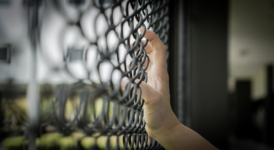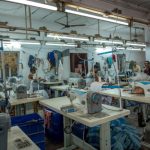The Offence Slavery in Australia

The word ‘slavery’ is often associated with situations of extreme power disparity between ‘masters’ and ‘servants’ in generations gone-by.
But the reality is the enslavement of humans by other humans persists across the globe to this very day, including right here in Australia.
What is slavery?
Whilst there are many definitions of slavery, it generally denotes the situation whereby one person is owned by another, as characterised by forced labour, inadequate or no remuneration and significant restrictions on personal liberty.
It is a state of affairs which is, and should be, considered as unacceptable in any society.
Modern slavery in Australia
The High Court of Australia handed down its judgment in Australia’s first slavery case in 2008.
The trial of The Queen v Tang involved Melbourne brothel owner Wei Tang and five Thai nationals, who had been working in her establishment.
The decision outlined the indicia of slavery, which are related to imbalance of power, the nature and extent of the exercise of power, and the lack of consent by the exploited party. The determination of whether a person is subjected to slavery considers the whole of the circumstances, which may be many and varied.
There are estimated to be 4,000 people working in slave-like conditions in Australia, primarily in the agricultural, fishing, sex, mining, construction, farming and cleaning industries.
Specific indicators of slavery include pressure to work for low or no wages (often for food and a bed only), having passports confiscated, maltreatment and living in squalid communal accommodation.
New South Wales
A taskforce by the Australian Federal Police (AFP) was commenced in July 2017 after Anti-Slavery Australia referred the matter of a Philippines women suspected of being enslaved by Australian couple Sheila and Joshua McAleer.
The investigation concluded mid-2021, with a Sydney man and woman sent to prison for putting the woman behind closed doors at the couple’s Rockdale home, and making her work around the clock as a cleaner and carer for their children, without proper remuneration.
The woman, who was considered to be the most culpable for the offence, was sentenced to 3 years and 3 months in prison, while her husband received 2 years and 6 months.
Another Australian couple, this time from Melbourne Victoria, at around the same time, were sentenced to prison, the woman for 8 years and the man for 6 years.
Anti-slavery Australia
Anti-slavery Australia Professor Jennifer Burn, a lawyer by profession, who served until 2020 as interim Anti-slavery Commissioner for NSW, has championed the importance of victims knowing that assistance is available, regardless of their visa status.
Anti-slavery Australia, which is based at University of Technology’s Faculty of Law in Sydney, is a specialist legal research and policy centre dedicated to the abolition of human trafficking, slavery and slavery-like practices in Australia, including forced labour and forced marriage.
This policy centre, say that there are well over 40 million people who live in slavery around the globe, with in excess of 70% being female.
This figure was based on statistics of several years ago, however, the International Labour Organisation, endorsed by the International Organisation for Migration estimate the figure in 2022 to be 49.6 million, with 25% considered to be children. (Reference date is 2021)
Australia has close to 2,000 individuals who are recorded as victims of modern slavery; however, it is estimated that only 1 in 5 are revealed as such, according to the Australian Institute of Criminology.
Professor Burn, along with the International Labour Organisation, suggest the number of people living in slavery in Australia is much higher than 15,000.
Anecdotal evidence suggests it would be vastly higher, in view of the size of the sex industry.
Former Prime Minister Scott Morrison in denial
Australian Prime Minister, Scott Morrison, on 11 June 2020 stated:
“..there was no slavery in Australia”.
Shortly thereafter, and following a public outcry, the Prime Minister apologised for his ignorant remarks, although it may be fair to say many Australians are of the same belief.
Australia’s Legacy on Slavery Since Colonisation
Reliable global historical data exists to prove that Australia, like many other nations throughout the world, engaged in slavery. Australia was involved in kidnapping (also known as Blackbirding) and coercion of Pacific Islander, Indian and Chinese citizens; notwithstanding Australia’s Indiginous citizens, to work as, in many instances, forced labour. Simply, as slaves.
These slaves, whom incidently weren’t convicts, were sent to work in the Sugarcane and Cotton Plantations, deemed essential to uphold Australia’s lucrative global market position.
Colonial Australia’s Foundation is Stained with the Profits of British Slavery
Indeed, many reputable global historians, including political scientist and historian, Clinton Fernandes of the University of New South Wales, lay claim that slavery helped finance the colonisation of Australia.
Fernandes stated that there is a largely unknown source of wealth: slavery.
This, indeed, continued in some form, until the 1970s
History supports this with photographic evidence, depicting many slaves shackled at the neck and marched up to 300km to work on such plantations.
When the World Realised Slavery was Wrong
Great Britain brought in the Slave Trade Act in 1807, during the reign of King George III, (who, incidentally, was pro-slavery) which abolished trading in slaves throughout the British Empire, but not, in fact, abolishing slavery. Similarly, a year later the United States followed, but, still only in a partial abolition.
1833 saw Britain, then under the reign of King George IV enact the Slavery Abolition Act, which finally abolished slavery within all of the countries in the British Empire.
When this Act received Royal Assent in 1834, Britain’s Royal Navy freed 800,000 African slaves in the Caribbean, South Africa and Canada.
Australia, the lucky country, wasn’t that lucky at all, as none of its slaves were freed by the Royal Navy.
The Corruption Aspect, at least in Great Britain and Ireland, at that stage was lessening.
USA Went to War with Itself – Pitting Father Against Son
America’s Civil War was concerned with, amongst other matters, the moral issue of slavery.
It commenced in 1861 and ended with the Confederate Army surrendering in 1865.
Approximately 2.5% (750,000) of the American population, at that time, died; more than were killed in both the First and Second World Wars combined.
4,000,000 African American slaves were set free.
Ancient Slave Trade
The year 6800BC, (approximately between 8,800 and 9,600 years ago) appears to be when the first reporting of slavery emerged; in what was known as Mesopotamia, which formed part of what is now, Iraq, Iran, Turkey, Syria and Kuwait.
Some historians debate this and place the dates between 6000 and 2000 BCE.
This though is again countered by other historians who claim that there are signs it emerged as long ago as 11,000 years, again in Mesopotamia, though wasn’t recorded that early.
There are however many conflicting dates and claimants of the earliest acknowledgement of slavery.
Suffice to say it started a very long time ago. Why quibble over a thousand or so years either way?
One must keep in mind that once upon a time, trading in slaves was a lucrative global business, in what was then considered a civilised society, involving Slave Trade Acts of legislation. Yes, slave trading was once legal.
Britain alone, having transported between 1640 and 1807, in excess of 3 million African slaves to its colonies in other countries.
Trading in slaves in a commercial way, however, even from Britain, started the previous century, albeit in a less organised, or legislated manner.
Modern Slavery Act 2018
Modern slavery is no different to ancient forms of slavery, apart from the fact it is more comprehensively specified and articulated.
It involves ownership and control over one’s life, involving force, or coercion, to restrict one’s own ability of being free to leave.
The difference this time, is that there are armies fighting against it. Governments, with the might of their military forces, police, Federal & State taskforces, United Nations organisations and Human Rights Organisations.
And yet, slavery still survives and in some places, flourishes, such is the billions of dollars of income it generates.
Slavery Weaves a Vast Web of Multiple Forms of Exploitation, involving:
- Kidnapping
- Deprivation of Liberty
- Human trafficking
- Forced labour
- Forced marriage
- Recruitment of Child Soldiers
- Sex Trade
- Deceptive commercial recruiting
It should be noted that a significant percentage of modern-day slavery involves the sex industry.
In Australia, the offences associated with modern slavery fall to be dealt with under the Commonwealth Criminal Code Act 1995 and come from within Divisons 270 and 271, with sentences ranging up to a maximum of 25 years imprisonment.
Corporate Australia Must Not Enable Slavery
This forces, by law, under the Modern Slavery Act 2018, many multi-national companies from all genres of the commercial world, to generate and provide reports on financial and employment matters, including their supply chains annually.
Those companies must also provide a report, describing their method for assessing and addressing the risks associated with modern slavery.
These reports are audited via the Australian National Audit Office (ANAO) similar to other countries audit systems, to be assessed by the relevant authorities tasked with monitoring modern slavery.
In Australia, these include the Immigration Department, Fair Work Ombudsman and the Modern Slavery and Human Trafficking Branch within Border Force and its State and Territory counterparts.
Technology to Combat Slavery
Many countries now have some form of Modern Slavery Legislation. For example, Australia has the Modern Slavery Act 2018 and a charter called the National Action Plan to Combat Modern Slavery 2020-2025.
Australian Federal Police, however, who received 294 reports of modern slavery and human trafficking in the 2021-22 financial year, has developed a technological program called look a little deeper; designed to assist State and Territory police to recognise signs of slavery and human trafficking within the community.
It will also be rolled out to other Commonwealth crime fighting organisations.
AFP Commander, Hilda Sirec, said that the community at large will also have access to an AFP confidential online form, as all of the community are capable of contributing to eradicating a significant portion of slavery, as signs are generally there. You just have to learn to report anything suspicious. For example:
- A person appears to be under the control of someone else.
- Reluctant to interact with others.
- Have very little personal belongings.
- Not being able to move around freely.
- Looking unkempt or malnourished.
- Signs of stress.
- Untreated injuries.
- Signs of physical abuse.
In NSW, if you need to make an urgent call, phone 000.
Alternatively, if there is no immediate danger, dial 131 AFP (which is the same as 131 237)
The Red Cross who will deliver the Support for Trafficked People Program, also involving enslaved individuals, will be part of the National Action Plan to Combat Modern Slavery 2020-25.
International Law
Australia’s adoption of the Economic Co-operation and Development (OECD) Anti-bribery Convention, saw the Criminal Code Act 1995 amended to prohibit bribery of a foreign public official and the like, similar to amendments to other jurisdictional legislations such as the US Foreign Corrupt Practices Act 1977 and the UK Bribery Act 2010
Domestic bribery against the Commonwealth and foreign bribery offences are both contained in the Criminal Code.
Whilst Australia and some other countries are currently finalising further proposed anti-corruption legislation; involving slavery and human trafficking, it is believed, though perhaps hoped is a more appropriate word, in light of the many years that member countries to the convention, including Australia, have dragged their feet in concluding it; it won’t be too long before signatories to the Convention are able to reach uniformity.
However, that could still be many months away.
It was only in December 2021 that Australia submitted an addendum to its its December 2019 Report, with an invitation from the OECD working group to provide a further report, outlining the establishment and implementation of adequate compliance measure to any proposed new corporate offence of failing to prevent foreign bribery.
OECD Anti-Bribery Convention
This Convention, which is officially known as the Convention on Combatting Bribery of Foreign Public Officials in International Business Transactions, was designed to encourage signatory countries to implement legislation to criminalise such bribery in 1997. Yes, 1997.
Whilst it is said that it will create a more level playing, criminal justice stakeholders believe it will be an integral additional tool in combatting slavery and human trafficking amongst other transnational crimes.
Whilst Australian law permits what are called facilitation payments, which can secure or expedite a transnational business deal, there currently exists no guidance in Australia in relation to what in fact constitutes such a gift. It is supposed to be of a minor nature, but what is that when we have seen large bribes worth millions of dollars paid to foreign individuals or entities by Australians or their companies.
The OECD has endeavoured to discourage Australia from this course of action in offering such gifts.
There are 44 members who are at varying degrees of implemenation of reforms necessary to stop the flow of bribes between countries.
Mathias Hubert Paul Cormann, Secretary-General of the OECD, a former Belgian-born Australian politician and Minister for Finance in Australia, in the 2021 OECD Annual Report made light of the lack of progress in approximately 25 years of trying to achieve uniformity amongst the 38 OECD members and 6 countries, not yet OECD members.
The OECD in its phase 3 report in 2012 (we did say it was a long project) criticised Australia’s enforcement efforts and in particular singled out the Australian Federal Police for failing to diligently process prosecutions.
OECD 4th phase report, whilst kinder to Australian efforts, said it had prosecuted and convicted 7 offenders. This was in 2017.
2019 saw the next report, whilst commending Australia on its whistleblowers laws which had improved, expressed that it was very concerned at the fact not all of its earlier recommendations had been carried out and that Australia’s record in prosecuting corporate cases was woeful.
Whilst the Australian Securities and Investment Commission (ASIC) has increased its prosecutions, Australia’s reforms as of 2022 has not been passed, making it unlikely its efforts to help stem the flow of slavery will be achieved.
Countries are increasingly working together to combat the corruption which facilitates modern slavery, but it seems not all countries, including Australia.
Australia, like many countries, is a signatory to 7 core International Human Rights Treaties, which include the right to freedom from slavery and forced labour; under article 8 of the International Covenant on Civil and Political Rights (ICCPR).
Why then, has it taken 25 years to implement such a critical component which could help eradicaate a significant percentage of slavery in the world?
Again, like other countries, Australia has embraced, amongst other similar treaties, the United Nations Convention against Transnational Crime (UNTOC) protocol, to prevent, suppress and punish human trafficking; by creating offences under law, in relation to the many facets associated with such crimes.
All of these organisations agree that the vast network of corruption only includes organised crime groups as one such entity.
Organised Crime
It is corruption of members of ostensibly legitimate but in fact criminal organisations, which are integral to the vast sums of money generated by slavery and all of its associated specific divisions.
Below is a list of the organisations identified:
- Various individuals tasked with law enforcement, such as police officers, customs officers, border-control officers and immigration officers.
- Individuals within Criminal Justice authorities, who may obstruct the investigations and prosecution of cases.
- Individuals of Government agencies, including parliamentarians, public officials and those tasked with protecting whistleblowers.
- The private sector, including banks, shipping companies, airline companies, travel agencies and other multinational companies.
Australia is one of 140 countries, who subscribe to the United Nations Convention against Corruption helped formed by Transparency International; a global movement to end the injustice of corruption by promoting transparency, accountability and integrity.
Serious Offence
Very serious consequencies await those charged with any form of slavery, which includes transnational human trafficking, which in some cases, may result in up to 25 years in prison.
There is a raft of other charges associated with more recent legislation, which most certainly will require the services of a solicitor, whether you are guilty, or not.
It’s not always a criminal intention which may see you before a Court of Law, in relation to a charge associated with slavery, or human trafficking.
For example, passivity, which may involve ignoring, or tolerating something which you are reasonably aware is illegal.
Indeed, it may simply be a personal lack of awareness, which could in some cases involve a violation of duties, derelict financial reporting, non-compliance with Anti-Slavery Legislation requirements; or alternatively be deemed to be corruption and/or participation in organised crime.
Whilst global financial estimates on the revenue from Modern Slavery varies, what is indisputable is that it is in the billions of dollars, annually.
As a result, some countries have enacted legislation, raising the penalties, in some instances to a maximum of Life Imprisonment.
The crime of slavery under New South Wales and Commonwealth law
Slavery is a criminal offence under both federal law and in state and territories across the nation.
New South Wales
Section 93AB(1) of the Crimes Act 1900 (NSW) is the offence of ‘Slavery, servitude and child forced labour’, which is where a person:
- holds another person in slavery or servitude and the circumstances are such that the person knows or ought to know that the person is held in slavery or servitude, or
- requires a child to perform forced or compulsory labour and the circumstances are such that the person knows or ought to know that the child is being required to perform forced or compulsory labour.
The maximum penalty for the offence is 25 years’ imprisonment for 25 years.
Subsection (2) makes it clear that forced or compulsory labour does not include:
- work or service normally required of a child who is under detention because of a court order or who, under a court order of this or another jurisdiction, has been conditionally released from detention or ordered to perform work in the community, or
- work or service required because of an emergency threatening the New South Wales community or a part of the New South Wales community, or
- work or service that forms part of normal civil obligations.
Subsection (3) states that regard may be had to all relevant circumstances when determining guilt or innocence.
Subsection (4) provides that the following may be relevant in that regard:
- any of the person’s personal circumstances (such as the person being a child, the person’s family relationships, and any mental or physical illness) which may make the person more vulnerable than other persons,
- any work or services provided by the person, including work or services provided in circumstances which constitute exploitation,
- the coercion, threat or deception involved,
- without limiting paragraph (c), whether the person has been coerced, threatened or deceived into doing anything which involves the supply or sale of the person’s tissue (within the meaning of the Human Tissue Act 1983).
Under section (5), the consent of a person (whether an adult or a child) to any of the acts alleged to constitute holding the person in slavery or servitude, or requiring the child to perform forced or compulsory labour, will not preclude a determination that the person is being held in slavery or servitude, or the child is required to perform forced or compulsory labour.
Section 93AC of the Act contains offences relating to ‘Child forced marriage’.
Under subsection (3), it is an offence punishable by up to 9 years’ imprisonment to:
(a) cause a child to enter into a forced marriage, and
(b) intend to cause, or be reckless as to causing, that forced marriage.
Subsection (4) will prescribe the same maximum penalty for entering into a marriage with a child.
Those who are convicted of these offences are subjected to prohibitions on engaging in certain types of conduct, any breach of which carries a prison sentence of up to two years and fine of up to $55,000.
The laws prescribe fines of up $1.1 million for companies that:
- fail to prepare a modern slavery statement;
- fail to publish that statement publicly in accordance with the Regulations; and
- knowingly provide false and misleading information in a modern slavery statement.
The laws also enable courts to make modern slavery risk orders, requiring corporations to take steps towards reducing the risks that such conduct is occurring in its supply chain, and being subjected to checks.
They also enable victims to access compensation under the Victims’ Rights and Support Act 2013 (NSW).
Commonwealth laws
Section 270.3 of the Criminal Code Act 1995 (Cth) provides that:
(1) A person who, whether within or outside Australia, intentionally:
(a) possesses a slave or exercises over a slave any of the other powers attaching to the right of ownership; or
(b) engages in slave trading; or
(c) enters into any commercial transaction involving a slave; or
(d) exercises control or direction over, or provides finance for:
(i) any act of slave trading; or
(ii) any commercial transaction involving a slave;
is guilty of an offence.
Penalty: Imprisonment for 25 years.
(2) A person who:
(a) whether within or outside Australia:
(i) enters into any commercial transaction involving a slave; or
(ii) exercises control or direction over, or provides finance for, any commercial transaction involving a slave; or
(iii) exercises control or direction over, or provides finance for, any act of slave trading; and
(b) is reckless as to whether the transaction or act involves a slave, slavery or slave trading; is guilty of an offence.
Penalty: Imprisonment for 17 years.
(3) In this section:
Slave trading includes:
(a) the capture, transport or disposal of a person with the intention of reducing the person to slavery; or
(b) the purchase or sale of a slave.
(4) A person who engages in any conduct with the intention of securing the release of a person from slavery is not guilty of an offence against this section.
(5) The defendant bears a legal burden of proving the matter mentioned in subsection (4).
Slavery offences are also contained in section 268.10 (Enslavement as a Crime Against Humanity), 268.15 (Sexual Slavery as a Crime Against Humanity), 268.60 (Sexual Slavery as an International War Crime) and 268.83 (Sexual Slavery as a National War Crime.
Receive all of our articles weekly
Related Articles
RELATED LEGISLATION
- Section 93AB Crimes Act 1900 | Slavery, Servitude and Child Forced Labour
- Section 93AC Crimes Act 1900 | Child Forced Marriage
- Section 268.10 Criminal Code Act 1995 | Crimes Against Humanity Enslavement
- Section 268.60 Criminal Code Act 1995 | International War Crime Sexual Slavery
- Section 268.83 Criminal Code Act 1995 | National War Crime Sexual Slavery
- Section 270.3 Criminal Code Act 1995 | Slavery






